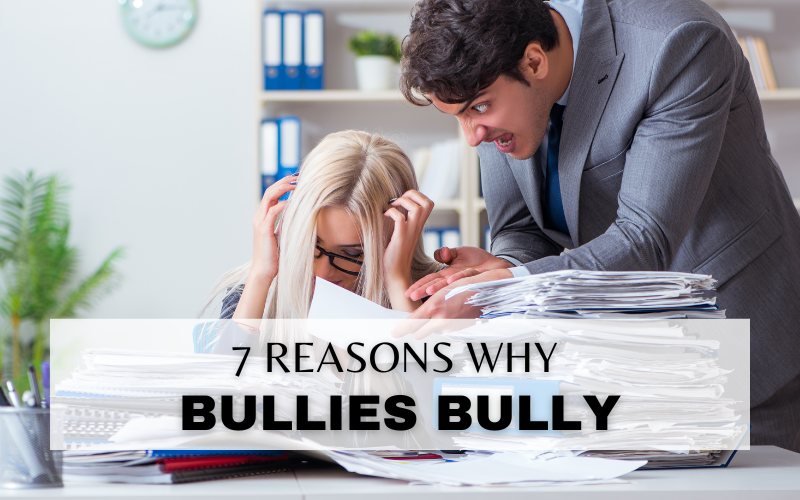I’m sure I’ve mentioned this previously, but I’ve been subject to bullying in the past, both personally and professionally. As you might imagine, I have done an incredible amount of research into what makes someone bully and how to deal with it – in fact, I’ve been studying the subject in-depth for about 15 years!
Researching, finding solutions and taking action are my ‘go-to’ behaviours whenever I have a negative experience. It helps me to keep away from leaning into the learnt helplessness I was taught as a child and allows me to take control and help others in the process.
We can’t always control what happens to us, but we can control how we react.
So, as we return to work and children go back to school after the summer break, I thought it an excellent time to raise the subject of bullying again. (I wrote extensively about narcissistic bullying earlier this year – read more here).
N.B. The information I share in this post can be used by anyone (adult or child) experiencing bullying, whether at work, home or on the playground. Honestly, I wish I had this information when I was experiencing mistreatment – my experiences and that of my abusers would have been very different!
What makes people bully
(I can’t take total credit for everything I’ve written here; I came across a piece of work by Chase Hughes, a world-renowned Body Skills Expert who sums this topic up perfectly.)
There are (at least) seven main reasons why people bully:
1. Loss of a feeling of control
Somewhere in their lives, either now or at some time in their past (maybe in childhood), the bully feels for has felt a lack of control. It could be that they have a very controlling partner, boss, parent or significant caregiver who was/is controlling them. Therefore, bullying others gives them back a sense of control.
2. Personal injury
The person has experienced a personal injury at some point in their lives, and they feel that if they can injure someone else, they can even the scale. They have a mentality of, ‘For me to succeed, others have to fail’ or ‘I’m failing because others are succeeding’. These bullies are looking to equalise the situation to feel better about themselves.
3. Needing to feel significant
Likely this type of bully felt insignificant growing up, or they may feel insignificant in another area of their life today. When they deliberately do something to hurt you, they know that you will get upset and find it difficult to stop thinking about them. As a result, they become significant in your life long after the incident occurred.
4. Wanting to even the scales
Someone who feels more insecure than you will want to even things out – similar to No 2. So, if you seem happier, more confident, in control, popular, or successful, they will want to do something to make you feel uncomfortable enough to tip the scales back in their favour. Typically this looks like putting down your successes, appearance, achievements, etc., often by passive-aggressive comments, building up their own fragile ego by making you feel bad.
5. Feeling small or vulnerable
This person generally feels small or vulnerable in some way. In their mind, the only way to grow and feel successful is to push other people down. Again, they will likely use passive-aggressive techniques to tear you down while building themselves up.
6. Feelings of shame
This will be a deep-rooted feeling of shame that they are hiding from the rest of the world. People like this will make fun of and shame other people. Their internal narrative will be something like, ‘If I can just make fun of this quality in someone else, that means I must not have it’.
7. Childhood programming
Many bullies reenact the behaviour that they witnessed in their childhood home. For example, if they repeatedly witnessed one parent bully another, them, their siblings or others, they may repeat the same behaviour through school and into adulthood.
Although bullying is horrific and can have far-reaching consequences, it’s important to know that it isn’t about you – it’s all about them. Essentially, BULLIES ARE INSECURE – they put others down to make themselves feel better. Make no mistake, they see your strength, energy, popularity, intelligence, beauty, etc. (even if you don’t), and it’s the polar opposite of how they feel about them themselves.
In the next week’s post, I’ll explain how to disarm a bully with twelve carefully worded comebacks. To be notified of when the post goes live, plus news and special offers, subscribe to my weekly newsletter here.
If there are any topics that you’d like me to cover in upcoming articles, I’d love to hear from you. Please feel free to email me a jo@jobanks.net.



